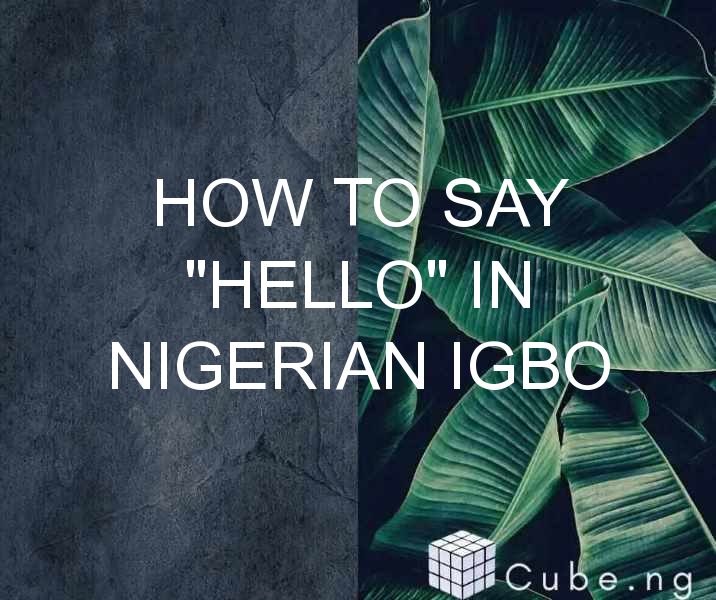Are you planning to visit Nigeria or interact with Nigerian Igbo people? If so, then you must know how to say hello in their native language. Learning how to say hello in Igbo is not only a sign of respect for their culture and language but also a great way to create a friendly atmosphere and connect with the locals. In this article, we will take a closer look at how to say hello in Nigerian Igbo and explore some of the nuances of the language.
Table of Contents
Understanding Nigerian Igbo Greetings
In Nigerian Igbo culture, greetings play a vital role in social interactions. It is customary to greet anyone you meet, whether they are friends, family, or strangers, as a sign of respect and courtesy. Greetings can vary depending on the time of day, the location, and the relationship between the people involved. For instance, a more formal greeting is expected when meeting someone for the first time or in a professional setting.
Basic Greetings in Nigerian Igbo
Here are some basic Nigerian Igbo greetings that you can use in different situations:
- Ndewo: This is the most common way to say hello in Nigerian Igbo. It is pronounced as “n-day-wor” and can be used at any time of the day. Ndewo is a formal greeting and can be used to greet anyone, regardless of their age or gender.
- Kedu: This is another formal greeting in Nigerian Igbo that can be used in any situation. It is pronounced as “ke-doo” and can be translated as “how are you?” or “what's up?” Kedu is often used as an icebreaker and can lead to further conversations.
- Olee: This is a more informal greeting among friends and peers. It is pronounced as “oh-leh” and can be translated as “hey” or “hi.” Olee is often used among young people or in informal settings.
- Nnoo: This is a more respectful greeting that is used for older people or people in positions of authority, such as elders or religious leaders. It is pronounced as “n-noh” and can be translated as “welcome” or “good day.”
Other Greetings in Nigerian Igbo
Apart from the basic greetings, there are other Nigerian Igbo greetings that are used in specific situations. For instance:
- Ezigbo nna: This is a greeting used specifically for fathers or father figures. It is pronounced as “eh-zee-gboh n-nah” and can be translated as “good father” or “wise elder.”
- Ezigbo nwanyi: This is a greeting used specifically for mothers or mother figures. It is pronounced as “eh-zee-gboh nn-wan-yee” and can be translated as “good mother” or “wise woman.”
- Odabo: This is a Yoruba greeting that is also commonly used among Nigerian Igbo people. It is pronounced as “oh-dah-boh” and can be translated as “goodbye” or “see you later.”
Tips for Pronouncing Nigerian Igbo Greetings
Pronouncing Nigerian Igbo greetings may seem daunting at first, but with a little practice, you can get the hang of it. Here are some tips to help you:
- Pay attention to the tone: Nigerian Igbo is a tonal language, which means that the meaning of a word can change depending on the tone used. Make sure to use the correct tone when pronouncing the greetings.
- Listen to native speakers: One of the best ways to learn how to pronounce Nigerian Igbo greetings is to listen to native speakers. You can watch videos online or interact with Nigerian Igbo people in person.
- Start slowly: Don't worry if you don't get the pronunciation right the first time. Start slowly and practice until you feel comfortable with the greetings.
Conclusion
Learning how to say hello in Nigerian Igbo is a great way to show respect for the culture and language of the people you are interacting with. Nigerian Igbo greetings can vary depending on the situation and the relationship between the people involved, but with the basic greetings listed in this article, you can start your interactions on the right foot.
FAQ
Q1. Is it important to learn Nigerian Igbo greetings?
A1. Yes, it is important to learn Nigerian Igbo greetings if you plan to interact with Nigerian Igbo people. Greetings are a vital part of their culture and can help you create a friendly atmosphere.
Q2. How do I know which greeting to use in a particular situation?
A2. The greeting you use can vary depending on the time of day, the location, and the relationship between the people involved. If in doubt, start with a more formal greeting like Ndewo or Kedu.
Q3. Can I use Nigerian Igbo greetings with anyone, regardless of their age or gender?
A3. Yes, you can use Nigerian Igbo greetings with anyone. However, some greetings like Nnoo are more respectful and are best used for older people or people in positions of authority.
Q4. How do I pronounce Nigerian Igbo greetings correctly?
A4. Nigerian Igbo is a tonal language, so it is important to pay attention to the tone when pronouncing the greetings. You can also listen to native speakers or start slowly and practice until you feel comfortable.
Q5. What are some other Nigerian Igbo phrases or words that I should know?
A5. Apart from greetings, there are other Nigerian Igbo phrases or words that you can learn, such as thank you (daalu), sorry (mee), and good night (ka emesia).




